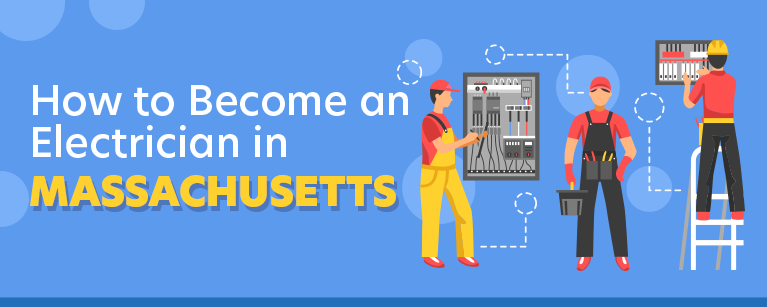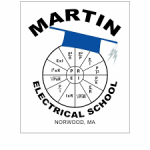
The demand for electricians is soaring in the state of Massachusetts!
With a steady income and plenty of room for growth, the electrical industry is one of the best ones for someone looking for consistent work.
So, if you’re looking to become an electrician in Massachusetts, this article will guide you on how to do just that!
Table of Contents
Electrician Job Duties and Skills in Massachusetts
The U.S. Bureau Of Labor Statistics states that electricians “Install, maintain, and repair electrical power, communications, lighting, and control systems in homes, businesses, and factories.”
An electrician should also be able to:
- Inspect electrical components, such as transformers and circuit breakers
- Repair or replace wiring, equipment, or fixtures using hand tools and power tools
- Direct and train workers to install, maintain, or repair electrical wiring or equipment
There are a lot of soft skills required to be a good electrician, too.
You’ll have to have empathy and understanding for those that you’re helping.
You’ll also need to perform good customer service, have great communication, and possess problem-solving skills to do your job efficiently.
How to Become an Electrician in Massachusetts
Becoming an electrician in Massachusetts is going to take some time, but it isn’t as difficult as it may seem.
In order to become an electrician, you must obtain a license, and to obtain a license, you’ll need to complete all of Massachusetts’ requirements.
Work Under A Licensed Electrician
You’ll need to work under a licensed electrician as part of any training program you choose to go with.
This is an important step in becoming an electrician because you must get hands-on experience while learning to ensure you’re capable of performing electrical duties.
Go Through A Technical Program
In Massachusetts, you must complete 8,000 working hours and 600 hours of board-approved education to obtain your electrical license.
To ensure that you meet the licensing requirements, you’ll want to go through a technical program or apprenticeship.
Technical programs are better for those who prefer more of a classroom environment.
Apprentice Program
For a more hands-on approach, you can enter an apprenticeship program instead.
These programs will allow you to spend less time in the classroom and more time out in the workforce.
There are lots of apprenticeships that give students the opportunity to earn a wage while working as an apprentice, too!
Apply for Your License
You can apply for your license through the Board of State Examiners of Electricians Licensing.
You’ll have to take the 80-question exam after you’ve completed all your work and classroom hours.
If you pass your exam, you’ll be rewarded with a license!
Training Programs for Electricians in Massachusetts
Here are some institutions in Massachusetts that offer electrical training programs.
JATC of Greater Boston
“One of the highest-rated and most prestigious apprenticeship programs in the country, the Boston Joint Apprenticeship and Training Committee (JATC) Training Program was created jointly by the International Brotherhood of Electrical Workers, Local 103, and the Greater Boston Chapter of the National Electrical Contractors Association (NECA) with one goal…
To produce the most highly skilled and professional electricians and technicians in the industry.”
The Greater Boston JATC Training Program offers a five-year Electrical Construction Program and a five-year Telecommunications Program.
During this course, you’ll attend class one day a week and work during the other days of the week on actual job sites where experienced journeypersons teach you the trade.
Benjamin Franklin Institute of Technology
At Benjamin Franklin Institute of Technology, you can earn a Certificate in Practical Electricity.
12-month Certificate of Proficiency is “Intended for the beginner who has no formal training in electrical theory or code.
Or for someone who has shadowed another electrician or learned basic principles at a vocational/technical school and wants to continue their formal training.”
The program provides the 600 hours of approved education needed for the Journeyman Electricians Licensing Exam.
Alongside an apprenticeship that will help you gain your working hours, this course is an excellent choice!
Martin Electrical & Technical School
Martin Electrical is a technical school that offers several educational programs for those who want to become electricians.
In their own words, “Martin Electrical and Technical School is a family-owned business with a solid tradition of providing electrical education services to Eastern Massachusetts and the surrounding area.
Our proven curriculum has provided hundreds of aspiring electricians the skills and knowledge necessary to allow them to become Licensed Electricians.”
The school offers specialized courses for anyone interested in becoming a Journeyman Electrician, Master Electrician, Systems Technician, and more.
| School Name | Address |
|---|---|
| JATC of Greater Boston | 194 Freeport St, Dorchester, MA 02122 |
| Benjamin Franklin Institute of Technology | 41 Berkeley St, Boston, MA 02116 |
| Martin Electrical & Technical School | 130 Kerry Pl, Norwood, MA 02062 |
Electrician Salaries in Massachusetts
Once your technical program or apprenticeship journey comes to a successful conclusion, you can expect plenty of exciting job opportunities to materialize within the electrical field!
The compensation for your work will closely mirror your expertise!
As a beginner, you may make around $50,000 per year, but as you increase your experience and expand your knowledge, you’ll begin making the average salary, which is around $70,000.
Some expert electricians in Massachusetts even go on to make $90,000 a year or more!
Annual Salary Range:| Location | Avg. Annual Salary |
|---|---|
| Boston | $73,528 |
| Cambridge | $73,528 |
| Lynn | $73,528 |
| Quincy | $73,528 |
| Brockton | $71,264 |
| Lowell | $71,192 |
| New Bedford | $69,437 |
| Fall River | $69,437 |
| Worcester | $68,869 |
| Springfield | $68,180 |
Regional Salary in Massachusetts
| Region | Employed | Avg. Annual Salary | Avg. Hourly Pay | Top 10% Annual Salary | Bottom 10% Annual Salary |
|---|---|---|---|---|---|
| Barnstable Town, MA | 490 | $76,640 | $36.84 | $105,560 | $46,170 |
| Boston-Cambridge-Nashua, MA-NH | 13,890 | $82,810 | $39.81 | $124,870 | $46,460 |
| Leominster-Gardner, MA | 150 | $71,650 | $34.45 | $101,010 | $45,670 |
| New Bedford, MA | 240 | $70,890 | $34.08 | $97,260 | $43,100 |
| Pittsfield, MA | 250 | $70,490 | $33.89 | $100,870 | $39,920 |
| Springfield, MA-CT | 1,450 | $81,360 | $39.12 | $131,950 | $46,000 |
| Worcester, MA-CT | 1,320 | $78,100 | $37.55 | $121,090 | $43,080 |
* Employment conditions in your area may vary.
Frequently Asked Questions
Do Electricians need a license in Massachusetts?
Yes, you will absolutely need a license in order to perform electrical work in the state of Massachusetts.
How long does it take to become a licensed electrician in Massachusetts?
It should take around four years or more to become a licensed electrician in Massachusetts.
Is it legal to do your own electrical work in Massachusetts?
As long as the work being done is residential, and the person performing the work resides on the property and is the property owner, yes.
It is legal to do your own electrical work in Massachusetts.
Electrician Info by State
- Alabama
- Alaska
- Arizona
- Arkansas
- California
- Colorado
- Connecticut
- Delaware
- Florida
- Georgia
- Hawaii
- Idaho
- Illinois
- Indiana
- Iowa
- Kansas
- Kentucky
- Louisiana
- Maine
- Maryland
- Massachusetts
- Michigan
- Minnesota
- Mississippi
- Missouri
- Montana
- Nebraska
- Nevada
- New Hampshire
- New Jersey
- New Mexico
- New York
- North Carolina
- North Dakota
- Ohio
- Oklahoma
- Oregon
- Pennsylvania
- Rhode Island
- South Carolina
- South Dakota
- Tennessee
- Texas
- Utah
- Vermont
- Virginia
- Washington
- West Virginia
- Wisconsin
- Wyoming









